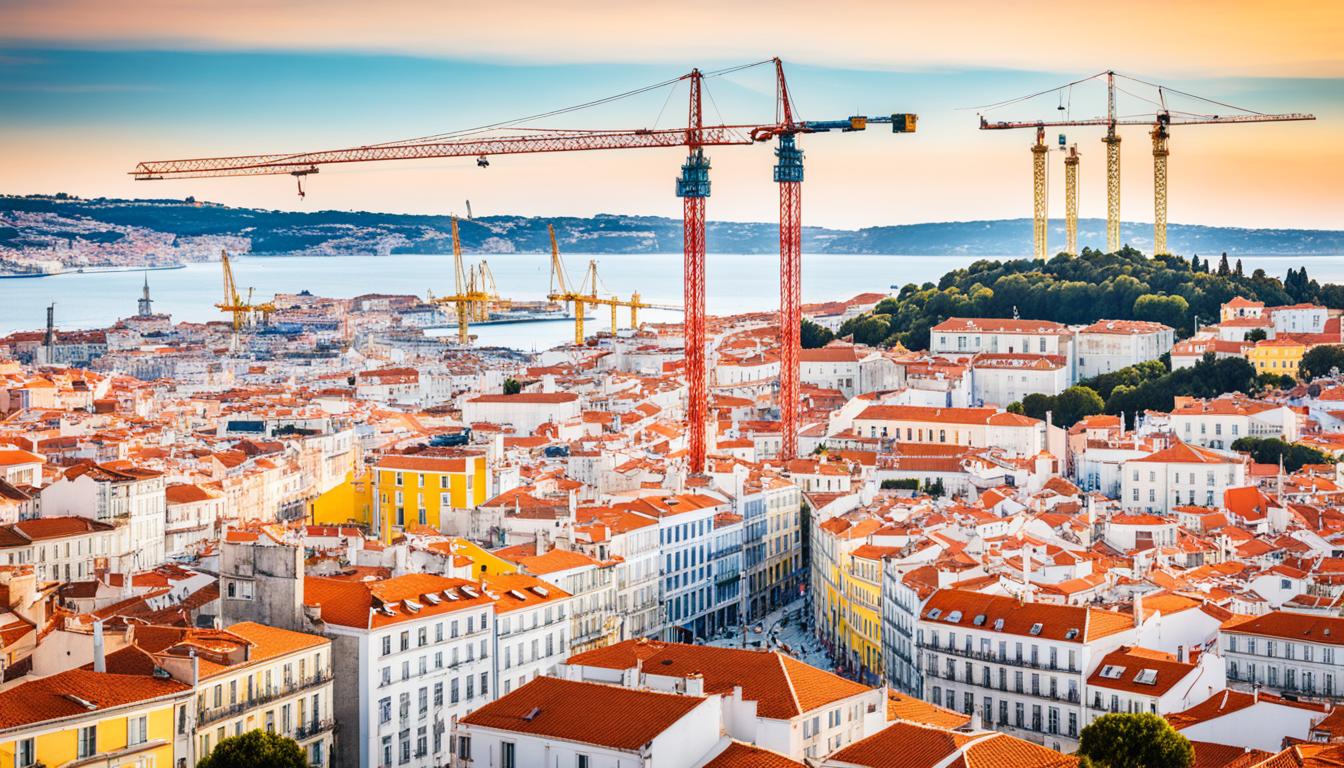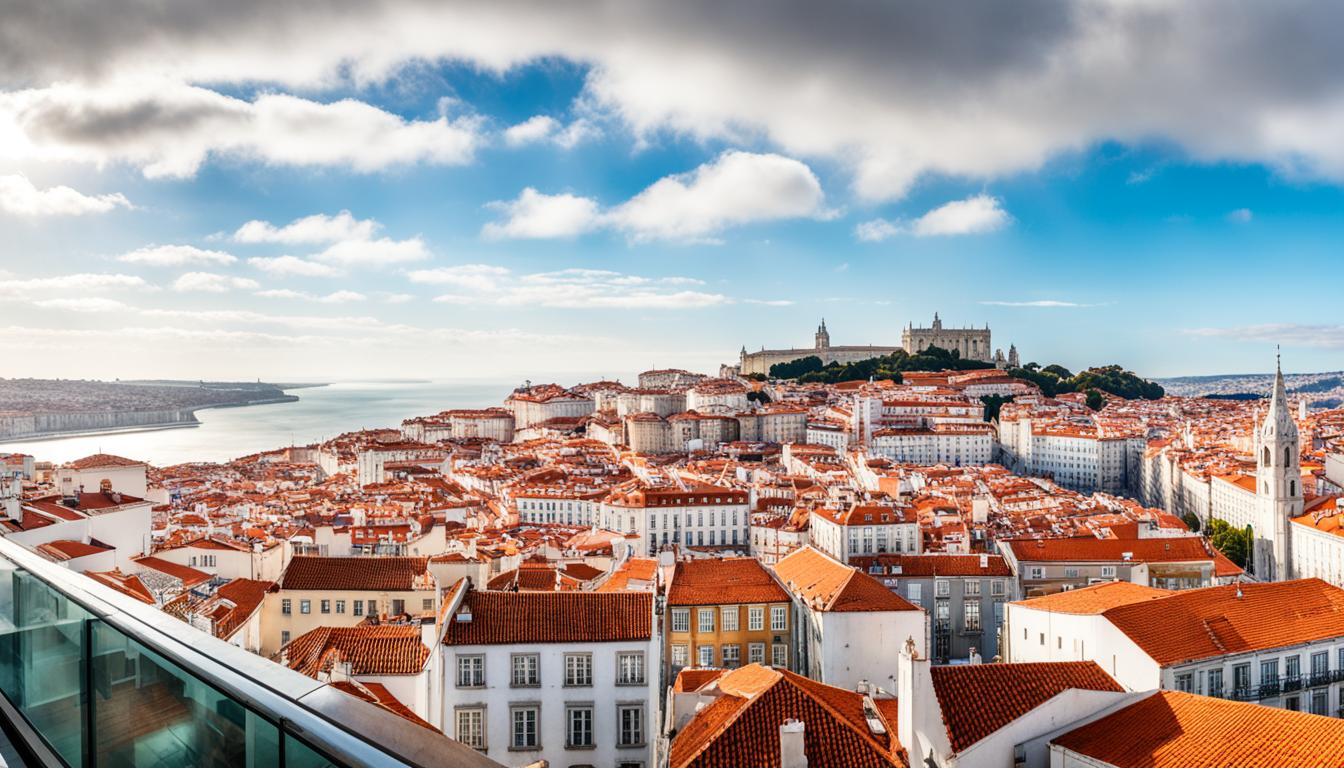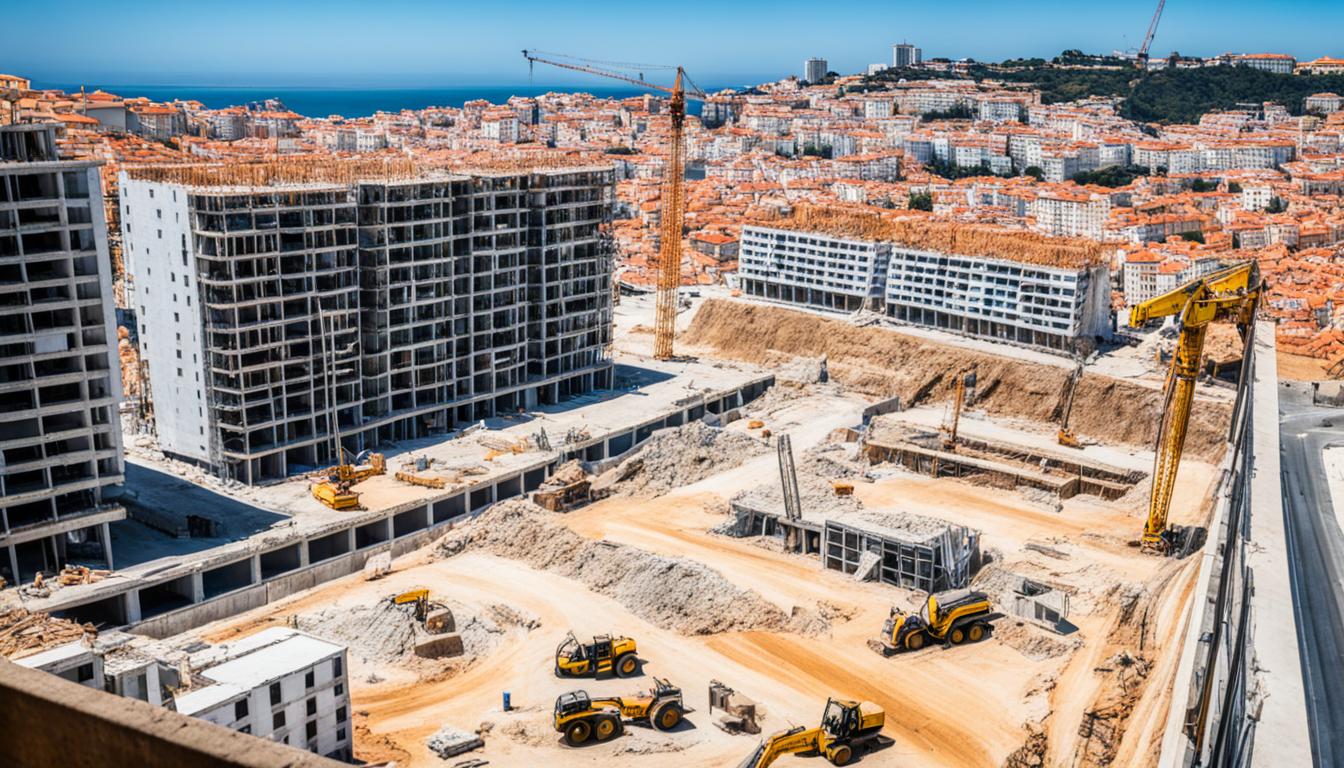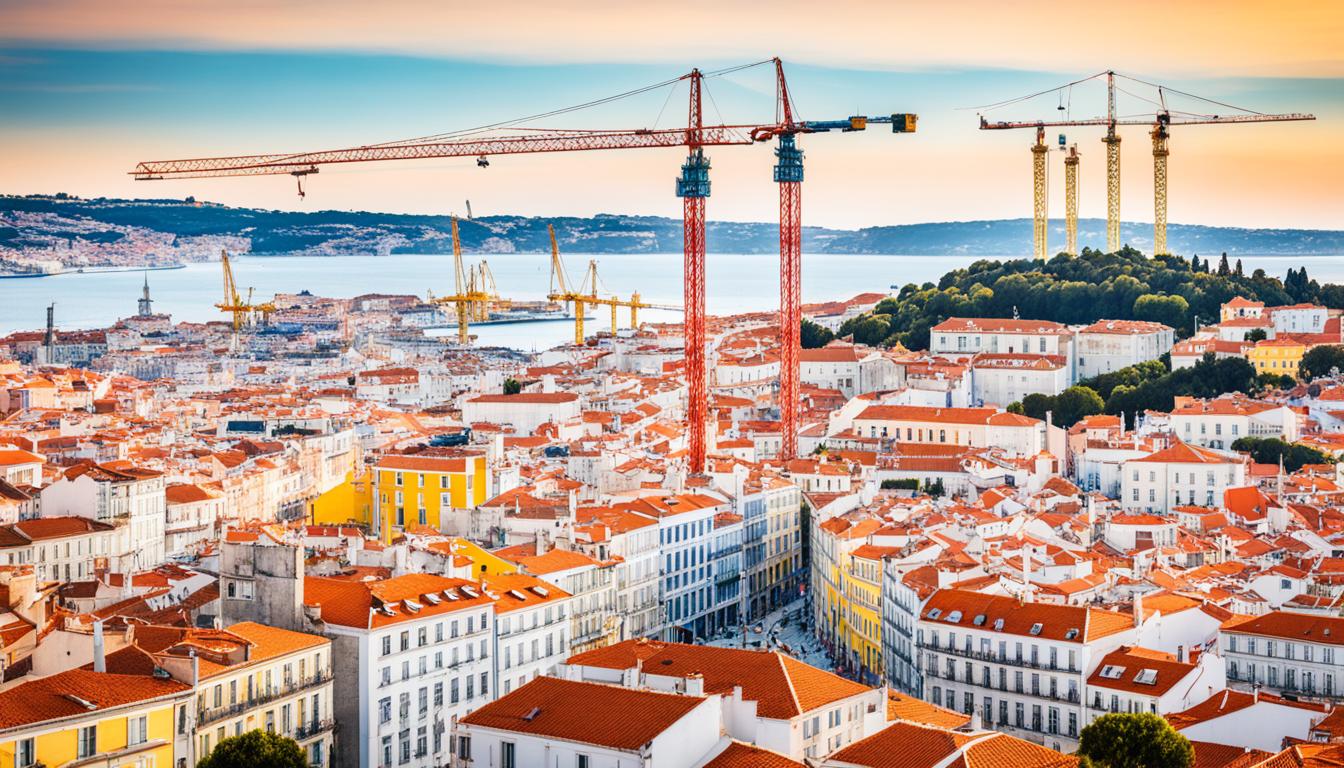Portugal's Property Market: Why It's Hot Right Now
The Portugal property market, as we see it today, has spawned a statistic that underscores its fiery state: In the vibrant heart of Lisbon, property costs have soared to an impressive €5,426 per square meter. This 5.8% leap is not just a figure—it's a record-breaking stride that signals a Portuguese real estate revolution, outpacing price growth in sought-after European cities like Milan, Madrid, and Berlin. Basking in a sunlit intersection of culture and commerce, we've seen investment in Portugal—notably buying property in Portugal—become an aspiration for a global audience, despite the local government's strategic measures to temper investment fervor.
In the tapestry of the Portugal real estate market, the Portuguese property prices narrate a tale of resilience and attraction. Even as the golden visa program waves its last goodbye, and tax incentives are calibrated for balance, the demand for a picturesque Portuguese lifestyle doesn't waver. We are persistently courting international investors, compelled by the undeniable draw of sun-kissed shores and a promise of tranquility amidst quaint city trams and historic cobbled alleys.

Key Takeaways
- Property investment in Portugal, especially Lisbon, is experiencing unprecedented growth, challenging other major European capitals.
- Lisbon's property market has reached new heights, with a notable jump in square meter prices.
- Despite changes to the golden visa program and tax revisions, the allure of buying property in Portugal continues unabated.
- The Portuguese climate and lifestyle remain pivotal in driving international demand in the face of limited supply.
- Portugal's global image as an idyllic European location keeps the nation's property market in sharp focus.
Booming Prices and International Appeal
As we delve into the nuances of Portugal's property market, our gaze turns toward the bustling streets of Lisbon, where the ascent in property prices mirrors the city's steep seven hills. The Lisbon surging costs, a topic of much discussion, stand testament to a thriving urban landscape that's capturing the hearts of investors worldwide. Let's explore the factors that are shaping up this phenomenon.

Lisbon's Surging Costs Outpace Major European Capitals
The metropolitan allure of Lisbon has caused a real estate rhapsody with unparalleled zest. Investing in Portuguese properties, especially in this charismatic city, means competing with a surge in valuation that's unprecedented in its history. With property for sale in Portugal becoming increasingly coveted, we witness the capital’s costs not just rising, but outpacing those of storied European neighbors.
The Appeal of the Portuguese Climate and Lifestyle
But what beckons this international clamor for tiles and terraces beneath Iberian skies? It's the seductive whisper of Portugal's climate and lifestyle—a siren song for sun-seekers and culture enthusiasts alike. The warm, Mediterranean embrace of the country offers more than just golden rays; it's a haven for myriad souls looking for a slice of paradise to call home.
The Impact of Investment Incentives: Golden Visa and Tax Breaks
The allure further deepens with financial melodies like the echoes of the Portugal golden visa—a recently-concluded symphony that orchestrated a significant influx of affluence into the Portuguese tapestry. While this concerto has dimmed, the residual harmony continues to influence the real estate choir. Let us put into perspective the lasting effects of these incentives through the following data representation.
| Year | Investment Pre-Golden Visa (€ Millions) | Investment During Golden Visa (€ Millions) | Investment Post-Golden Visa (€ Millions) |
|---|---|---|---|
| 2015 | 630 | 872 | N/A |
| 2016 | 755 | 1,085 | N/A |
| 2017 | 900 | 1,326 | N/A |
| 2018 | 1,010 | 1,500 | N/A |
| 2019 | N/A | 1,742 | Current |
| 2020 | N/A | 1,923 | Estimation |
The dissemination of these figures elucidates the tangible change catalyzed by initiatives aimed at enticing global citizens to partake in Portuguese prosperity through investing in Portuguese properties. Whilst the landscape of investment incentives morphs, we find ourselves part of a narrative where the charm of Portugal—and its magnetic metropolis, Lisbon—continues to evoke wide-eyed wonderment and widespread capital investment.
Portugal Property Market Dynamics
Delving into the housing market in Portugal, we uncover a landscape of evolution with significant implications for those interested in investing in Portuguese properties. An intricate interplay of supply and demand characterizes the current situation, shaped by the appetites of domestic and overseas investors alike. Steeped in the reality of a finite number of properties available, this is a market where every trend and shift demands careful Portuguese property market analysis. With a strong and steadfast increase in Portuguese property prices, the demand for homes, especially in the sought-after regions of Lisbon and the Algarve, continues unabated.
Our analysis points to a stark disparity between construction rates and home sales, a phenomenon contributing to the surge in market values. Notably, a staggering ten homes are asserted to have been sold for every single construction completed between 2018 and 2022, underlining the imbalance that fuels the ascent in prices. Despite interventions designed to cool the market—such as policy changes and the curtailment of programs aimed at stimulating foreign investment—the trajectory for property investment in Portugal anticipates an average growth of approximately 8.7% moving into the year 2024.
- Demand outstripping supply, particularly in regions with high foreign investment interest
- Property value growth continually shapes the economic narrative
- Robust prospective price increase across the Portuguese property landscape.
As analysts and investors, we remain cognizant of these undercurrents impacting the Portuguese property market. The unparalleled allure of Portugal's sunny shores for investors ensures that despite any ebb and flow of policies or economic conditions, the foundational attractiveness of the market remains steadfast. Hence, the Portuguese property market remains a realm with compelling potential for investment opportunities.
The Aftermath of Housing Demand Exceeding Supply
As we delve into the complexities of Portugal's property landscape, the repercussions of a climbing demand that surpasses housing supply become evident. The protracted period one must wait to traverse the slow construction and licensing processes is not just a minor inconvenience—it's reshaping the housing market in profound ways. Our examination sheds light on how these factors are impacting the social housing market in Portugal and rental markets, while resonating through the property for sale and Portuguese property prices.
Consequences of Slow Construction and Licensing Processes
Vanguard Properties throws into stark relief the reality of the situation, noting how extended waits, in some cases up to eight years, derail the timely delivery of new housing projects. This has precipitated a tangible scarcity, creating a vacuum where demand continues unabated while supply trickles. The result? Prices surge, and those seeking to invest or find a home are left grappling with an unforgiving market.

The cascade of effects from these delays is far-reaching. We observe the strain it imposes, not only on potential new homeowners but on the overall tempo of Portugal's economic growth in the real estate sector—a pivotal industry in the nation's burgeoning economy.
Effects on Social Housing and Rental Markets
The chasm between property availability and affordability widens, exerting pressure on the backbone of social housing initiatives in Portugal. A scant supply to accommodate social housing needs amplifies the plight of many Portuguese families, with rental markets in Portugal straining under the weight of escalating costs. Communities on the margins find themselves facing the grim prospect of housing instability, an outcome that's both sobering and pressing for societal intervention.
| Aspect | Impact |
|---|---|
| Construction and Licensing Delays | Severely limited new housing availability |
| Property Prices | Persistent upward trend, increasing cost of living |
| Social Housing | Insufficient stock to meet demand |
| Rental Market | Inflated rental prices, creating affordability issues |
In sum, the coupling of slow construction and tedious licensing processes with an already voracious appetite for property in Portugal has yielded a challenging panorama. From the social housing market to the rental sphere, the ramifications are palpable, spurring a need for resolutions that can cultivate a more harmonious and accessible property landscape.
Real Estate Hotspots: Lisbon and the Algarve
As seasoned observers of the Portuguese property market, we've noticed an unwavering interest in Lisbon and the Algarve, which have solidified their positions as real estate hotspots in Portugal. Our focus is on tapping into the Lisbon growth and attraction, recognizing the city as a nexus of cultural and economic activity that resonates with investors and property seekers. The capital's continued expansion has been particularly evident in opulent districts like Cascais, Estoril, and Sintra—areas synonymous with luxury and a high standard of living. With rental yields in the city hovering around 5.2 percent, investing in Lisbon's property market looks to remain a sound choice for those seeking viable assets in an evolving landscape.
Capitalizing on Lisbon’s Growth and Attraction
Our strategy embraces Lisbon's evolution, targeting established and emergent neighborhoods where the potential for capital gains is most significant. In these locales, property for sale in Portugal is not merely a transaction, but a multifaceted investment in the city's vibrant future. Lisbon's cosmopolitan flair coupled with its historical charm presents a rare blend that appeals to a diverse spectrum of purchasers—from the entrepreneur seeking a strategic foothold to the digital nomad yearning for a picturesque backdrop for their remote endeavors.
The Algarve: High Demand for Luxurious Beachside Living
The Algarve, celebrated for luxurious beachside living in Portugal, entices us with its pristine shores and exclusive communities. Here, the allure of the sun-kissed Golden Triangle, especially within the confines of prestigious enclaves such as Quinta do Lago, cannot be overstated. The Portuguese property market in this region promises not just a residence, but a lifestyle investment, complemented by world-class golf courses, serene natural parks, and the vibrant social tapestry of international residents. We foresee prices escalating further, bolstering the Algarve's position as a not-to-be-missed opportunity for discerning investors hungry for high returns and idyllic settings.
FAQ
What is driving the current boom in Portugal's property market?
The Portugal property market boom is driven by several factors, including the country's appealing climate and lifestyle, strong international demand, and previous investment incentives such as the golden visa program and favorable tax breaks. Despite the end of some incentives, the market remains hot as the allure of living or investing in Portugal continues to attract foreign buyers.
How have Lisbon's real estate costs changed compared to other European capitals?
Lisbon's real estate costs have spiked significantly, reaching €5,426 per square meter and experiencing a growth rate that outpaces many other major European cities including Milan, Madrid, and Berlin. This surge has set new records for property costs in the city, making Lisbon a standout market in the region.
What impact have Portugal's climate and lifestyle had on the real estate market?
Portugal's sunny climate and relaxed lifestyle have had a magnetic appeal, drawing in international investors and homebuyers looking for favorable living conditions. This has contributed significantly to the hot property market, with continuous robust demand from those wishing to enjoy the country's rich culture and warm weather.
Are investment incentives like the golden visa program still influencing the Portuguese property market?
Yes, although the golden visa program has been terminated, the influence of this and other incentives can still be felt in the Portuguese property market. They have historically attracted a swath of affluent foreign investors, which has raised demand and contributed to property price escalations, and their legacy continues to impact market dynamics.
How is the supply and demand situation affecting the property market in Portugal?
The supply of new homes in Portugal is failing to keep up with the rising demand, especially in popular areas such as Lisbon and the Algarve. With ten homes being sold for every one built from 2018 to 2022, this imbalance has contributed to a significant increase in property values. Dwindling supply and steady demand have led to a predicted price rise of 8.7% into 2024.
What are the consequences of the slow construction and licensing processes in Portugal?
Slow construction and extended licensing processes have led to a severe shortage in new homes, affecting both social housing availability and the rental market. Some constructions are delayed due to licensing processes spanning several years, exacerbating the housing shortage and leaving no new units available for sale in certain years.
How has the shortfall in available homes in Portugal impacted social housing and rental markets?
The deficit in home availability is causing a crisis in social housing, with only a tiny fraction of the total housing stock allocated for this purpose. Rental prices have soared, making it unaffordable for many Portuguese households and leading to precarious living situations, as evidenced by the emergence of tent communities near Lisbon, among other social challenges.
Why is Lisbon considered a real estate hotspot in Portugal?
Lisbon is recognized as a high-value hotspot in Portugal's real estate market due to its sustained growth, cultural attraction, and rental yields, which are quite lucrative. Areas like Cascais, Estoril, and Sintra are particularly appealing to investors and residents, offering a blend of luxury living and investment opportunities.
What makes the Algarve an attractive area for property investment?
The Algarve boasts high demand for luxurious beachside living, amplified by its world-renowned golf courses, natural beauty, and an international community. The region, especially the Golden Triangle, has a rich offering of premium properties, with prices expected to rise further due to persistent demand.

